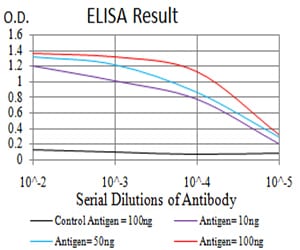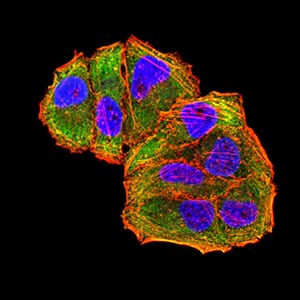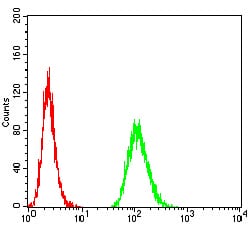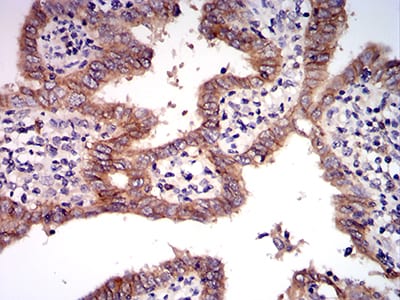




| WB | 咨询技术 | Human,Monkey |
| IF | 咨询技术 | Human,Monkey |
| IHC | 1/200 - 1/1000 | Human,Monkey |
| ICC | 1/200 - 1/1000 | Human,Monkey |
| FCM | 1/200 - 1/400 | Human,Monkey |
| Elisa | 1/10000 | Human,Monkey |
| Aliases | HGFR; AUTS9; RCCP2; c-Met; DFNB97 |
| Entrez GeneID | 4233 |
| clone | 5E9C4 |
| WB Predicted band size | 155kDa |
| Host/Isotype | Mouse IgG1 |
| Antibody Type | Primary antibody |
| Storage | Store at 4°C short term. Aliquot and store at -20°C long term. Avoid freeze/thaw cycles. |
| Species Reactivity | Human,Monkey |
| Immunogen | Purified recombinant fragment of human MET (AA: 743-932) expressed in E. Coli. |
| Formulation | Purified antibody in PBS with 0.05% sodium azide |
+ +
以下是3-4篇关于MET抗体的代表性文献及其摘要概括:
---
1. **文献名称**: *Onartuzumab in combination with erlotinib in advanced non-small cell lung cancer*
**作者**: Spigel DR et al.
**摘要**: 该研究评估MET单抗Onartuzumab联合厄洛替尼治疗晚期非小细胞肺癌(NSCLC)的III期临床试验。结果显示,与安慰剂组相比,联合治疗未能显著改善患者总生存期或无进展生存期,提示MET靶向治疗需精准筛选生物标志物阳性患者。
---
2. **文献名称**: *SAIT301. a humanized anti-MET antibody, suppresses tumor growth in MET-amplified gastric cancer models*
**作者**: Jin H et al.
**摘要**: 本研究报道了人源化MET单抗SAIT301在MET扩增胃癌模型中的疗效。SAIT301通过阻断HGF/MET信号通路并诱导MET内吞降解,显著抑制肿瘤生长,为MET依赖性肿瘤的靶向治疗提供了临床前证据。
---
3. **文献名称**: *Sym015: A MET antibody mixture with enhanced efficacy in models of MET-amplified cancers*
**作者**: Kragh M et al.
**摘要**: 研究开发了针对MET不同表位的双抗体混合物Sym015.其在MET扩增或exon 14跳跃突变的肿瘤模型中表现出协同作用,可克服单抗耐药性并显著抑制肿瘤生长,支持其作为广谱MET靶向治疗的潜力。
---
4. **文献名称**: *MET-targeted antibody resistance mediated by HER kinase activation*
**作者**: Mazieres J et al.
**摘要**: 该文献揭示了MET单抗治疗小细胞肺癌(SCLC)的耐药机制。研究发现,HER家族激酶(如EGFR、HER3)的代偿性激活可导致MET抗体疗效下降,提示联合抑制HER/MET信号通路可能延缓耐药。
---
以上文献涵盖MET抗体在临床前研究、临床试验及耐药机制中的关键进展,反映了该领域的挑战与潜在策略。
MET antibodies are therapeutic or diagnostic agents targeting the MET receptor, a tyrosine kinase receptor encoded by the *MET* proto-oncogene. MET, also known as hepatocyte growth factor (HGF) receptor, plays a critical role in embryogenesis, tissue repair, and cancer progression by regulating cell proliferation, survival, motility, and angiogenesis. Aberrant MET signaling, caused by gene amplification, mutations, or HGF overexpression, is implicated in tumor growth, metastasis, and resistance to therapies in various cancers, including lung, gastric, and hepatocellular carcinomas.
Therapeutic MET antibodies are designed to block HGF binding or receptor dimerization, inhibiting downstream signaling. Examples include monovalent monoclonal antibodies (e.g., onartuzumab) and bivalent antibodies (e.g., emibetuzumab). While early clinical trials showed mixed results—onartuzumab failed in phase III trials for non-small cell lung cancer (NSCLC)—renewed interest focuses on patient stratification using biomarkers (e.g., *MET* amplification/exon 14 skipping) and combination therapies. Bispecific antibodies targeting MET alongside other receptors (e.g., EGFR or VEGF) aim to enhance efficacy and overcome resistance.
Diagnostic MET antibodies aid in detecting MET overexpression or activation in tumors, guiding targeted therapy decisions. Challenges include tumor heterogeneity, limited predictive biomarkers, and compensatory signaling. Ongoing research explores next-generation antibodies, antibody-drug conjugates, and immunotherapies to optimize MET-targeted strategies in precision oncology.
×